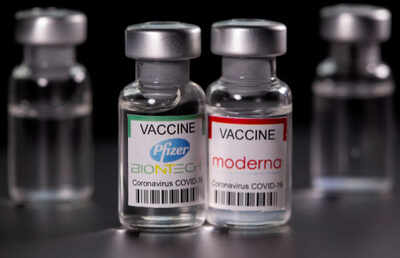Top Searches
- News
- World News
- Rest of World News
- Poorer nations short of Covid vaccine supply: WHO
Poorer nations short of Covid vaccine supply: WHO

The Pfizer BioNtech (left) and the Moderna (right) Covid-19 vaccines. (Photo credits: Reuters)
LONDON: Many poorer countries lack Covid-19 vaccine doses to continue with their inoculation programmes, the World Health Organization (WHO) has said.
WHO senior adviser Dr Bruce Aylward said that the Covax programme (the international vaccine-sharing initiative) had delivered 90 million doses to 131 countries, but it is nowhere near enough to protect populations from the deadly virus, the BBC reported on Monday.
Trinidad and Tobago, Uganda, Zimbabwe and Bangladesh have reportedly run out of vaccines in recent days.
Out of the 80 low-income countries involved in Covax "at least half of them do not have sufficient vaccines to be able to sustain their programmes right now", Aylward said, at a WHO briefing in Geneva on Monday.
"If we look at what we're hearing from countries on a day-to-day basis, well over half of the countries have run out of stock and are calling for additional vaccines, but in reality, it's probably much higher" Aylward said.
He said that some countries had tried to make alternative arrangements to end shortages, with harsh consequences, such as paying above market value for vaccines.
On Monday, South African President Cyril Ramaphosa called for an end to vaccine hoarding by wealthier countries as his government scrambled to curb a steep rise in cases.
On a continental level, only 40 million doses have been administered so far in Africa, which is less than 2% of the population, Ramaphosa said.
To address this, he said his government was working with Covax to create a regional hub to produce more vaccines in South Africa.
Led by the WHO and other international organisations, Covax initially set a target of providing two billion doses worldwide by the end of 2021.
Most of those are being donated to poorer countries, where Covax hopes to distribute enough vaccines to protect at least 20% of the populations.
However, the BBC reported that the distribution of these vaccines has been hampered by manufacturing delays and supply disruptions, leading to shortages in countries that are wholly reliant on Covax.
Earlier this month, the Group of Seven (G7) countries (Canada, France, Germany, Italy, Japan, the UK and the US) also pledged to donate one billion doses of Covid-19 vaccines to poor countries to help vaccinate the world by the end of next year.
Of the one billion vaccine doses, a majority of the stock will go to the Covax programme while the rest will be shared bilaterally with countries in need.
WHO senior adviser Dr Bruce Aylward said that the Covax programme (the international vaccine-sharing initiative) had delivered 90 million doses to 131 countries, but it is nowhere near enough to protect populations from the deadly virus, the BBC reported on Monday.
Trinidad and Tobago, Uganda, Zimbabwe and Bangladesh have reportedly run out of vaccines in recent days.
Out of the 80 low-income countries involved in Covax "at least half of them do not have sufficient vaccines to be able to sustain their programmes right now", Aylward said, at a WHO briefing in Geneva on Monday.
"If we look at what we're hearing from countries on a day-to-day basis, well over half of the countries have run out of stock and are calling for additional vaccines, but in reality, it's probably much higher" Aylward said.
He said that some countries had tried to make alternative arrangements to end shortages, with harsh consequences, such as paying above market value for vaccines.
On Monday, South African President Cyril Ramaphosa called for an end to vaccine hoarding by wealthier countries as his government scrambled to curb a steep rise in cases.
On a continental level, only 40 million doses have been administered so far in Africa, which is less than 2% of the population, Ramaphosa said.
To address this, he said his government was working with Covax to create a regional hub to produce more vaccines in South Africa.
Led by the WHO and other international organisations, Covax initially set a target of providing two billion doses worldwide by the end of 2021.
Most of those are being donated to poorer countries, where Covax hopes to distribute enough vaccines to protect at least 20% of the populations.
However, the BBC reported that the distribution of these vaccines has been hampered by manufacturing delays and supply disruptions, leading to shortages in countries that are wholly reliant on Covax.
Earlier this month, the Group of Seven (G7) countries (Canada, France, Germany, Italy, Japan, the UK and the US) also pledged to donate one billion doses of Covid-19 vaccines to poor countries to help vaccinate the world by the end of next year.
Of the one billion vaccine doses, a majority of the stock will go to the Covax programme while the rest will be shared bilaterally with countries in need.
FacebookTwitterLinkedinEMail
Start a Conversation
end of article
